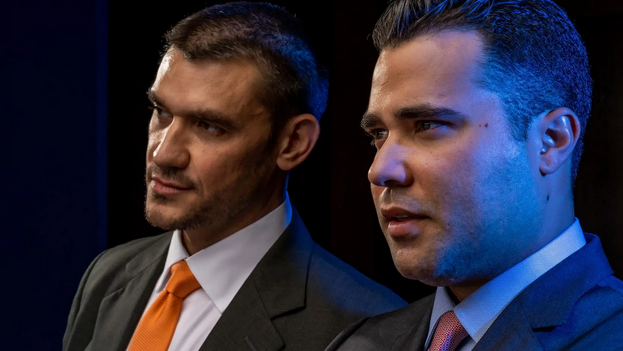
![]() EFE (via 14ymedio), Miami, 28 October 2022 –The return of the balserito (little rafter) Elián González to Cuba, a fact that divided American public opinion to the point of influencing the 2000 presidential elections, has become a theatrical drama in Miami, and its authors take the controversy for granted.
EFE (via 14ymedio), Miami, 28 October 2022 –The return of the balserito (little rafter) Elián González to Cuba, a fact that divided American public opinion to the point of influencing the 2000 presidential elections, has become a theatrical drama in Miami, and its authors take the controversy for granted.
“We have worked hard. First of all, it’s about an event with which everyone has a very emotional relationship, because it divided the community,” Venezuelan Michel Hausmann, who founded the Miami New Drama company 16 years ago and is in charge of the staging of Elián, told EFE.
Hausmann and the Cuban-American playwright Rogelio Martínez have been working on this play for two years doing “deep research.” The director feels that it’s “the most important” of those that his company has produced.
Elián will be performed in English with Spanish subtitles at the Colony Theatre, in Miami Beach, from Thursday October 29th until November 20.
In November 1999, the little balsero, Elián González, then six years old, traveled with his mother and other Cubans who were trying to reach Florida on a precarious boat; Elián was rescued though his mother drowned. He was caught in a tug of war between the Government of Cuba and the exiles in Miami, which was settled with a ruling by an American judge that allowed his return to the Island and to his father.
Before his return to Cuba, the boy had been welcomed in Miami’a “Little Havana” where he lived with an uncle and other relatives after his rescue by some fishermen in waters near Florida.
Elián’s removal from this uncle’s home was captured in the famous photo that earned the now-deceased Alan Díaz a Pulitzer, showing little Elián in the arms of one of the fishermen who saved him, Donato Dalrymple, and terrified by the uniformed man in riot gear who is pointing a gun at his uncle.
It was April 22, 2000, and the order to enter the house had been given by Janet Reno, then U.S. Attorney General.
According to the director of the work, Elián will surprise the public with new information about what exactly happened during the hours of negotiations by members of the Cuban exile community in the U.S. and the Democratic Government of then-president Bill Clinton.
The work has real-life characters such as Cuban-American businessman Jorge Mas Santos, prosecutor Janet Reno, lawyer and politician Manny Díaz and former U.S. vice president Al Gore, a Democratic candidate who in 2020 lost the presidential election to Republican George W. Bush.
There are other characters like Lázaro and Marisleysis González, relatives of Elián in Miami, and fisherman Donato Dalrymple, but the child is not represented at the center of this story.
“The work brings together all the political and family figures who participated in this process and their decisions, some pure and others more controversial,” details Martínez, 51, who, like Elián, arrived in this country as a child by sea.
The director specifies that it’s a piece of fiction, and they don’t intend to say that “the conversations were exactly like that.”
“We speak with Manny Díaz, who was one of the lawyers for Elián’s family. Díaz came (from Cuba) to the United States at the age of 6 without his father, who was a political prisoner. When he enters this story he is revisiting his life,” explains Martínez.
Manuel Alberto Díaz (Manny), current leader of the Democratic Party in Florida and former mayor of Miami, is the central character in the play. “More than the character of Elián,” comments Hausmann.
Two other key consultants were the Cuban-American businessmen Carlos de la Cruz and Carlos Saladrigas, “the Carloses,” as Martínez calls them, who had obtained a line of direct negotiation with the federal prosecutor’s office and were inside the house when the agents took Elián.
According to the playwright and from the research, it all seemed like the boy would stay with his relatives in Miami.
“The fax in the house didn’t work, and the document was ready to be sent, but at the last moment they decided to move everything. The decision that Washington made endangered many people, and both Carlos and Manny could have left their children without fathers,” emphasizes Martínez, one of the authors of “Born In East Berlin,” presented for the first time at the Stasi Museum in Berlin.
Martínez affirms that the case of Elián was key in the tight presidential elections of 2000, which were actually decided in Florida by only 184 votes, in favor of Bush.
Elián González, who is now 28 years old and is an industrial engineer, was handed over by the U.S. to his father, Juan Miguel González, who returned with him to Cuba, where Fidel Castro elevated the child to the category of child hero.
Translated by Regina Anavy
____________
COLLABORATE WITH OUR WORK: The 14ymedio team is committed to practicing serious journalism that reflects Cuba’s reality in all its depth. Thank you for joining us on this long journey. We invite you to continue supporting us by becoming a member of 14ymedio now. Together we can continue transforming journalism in Cuba.
